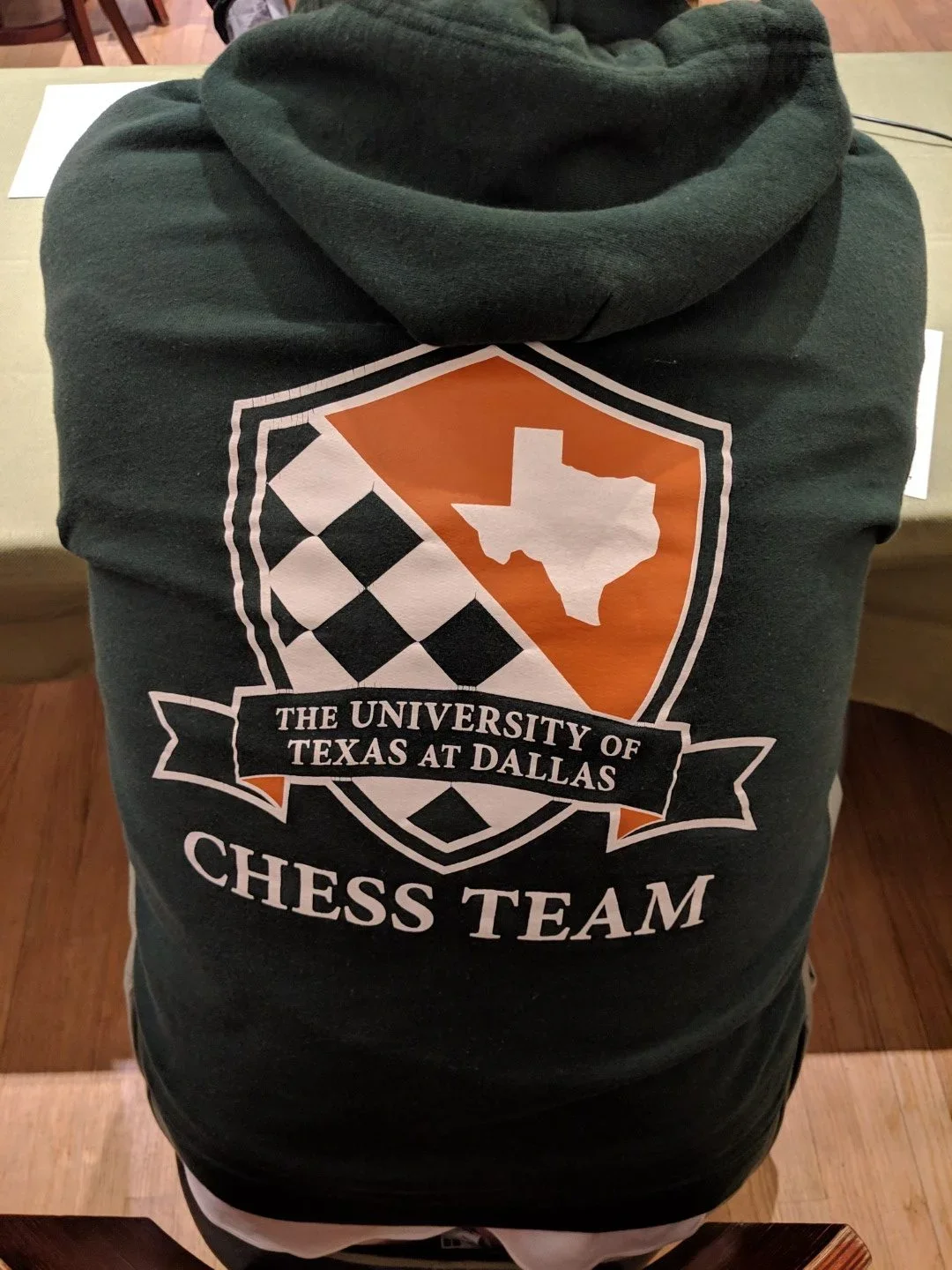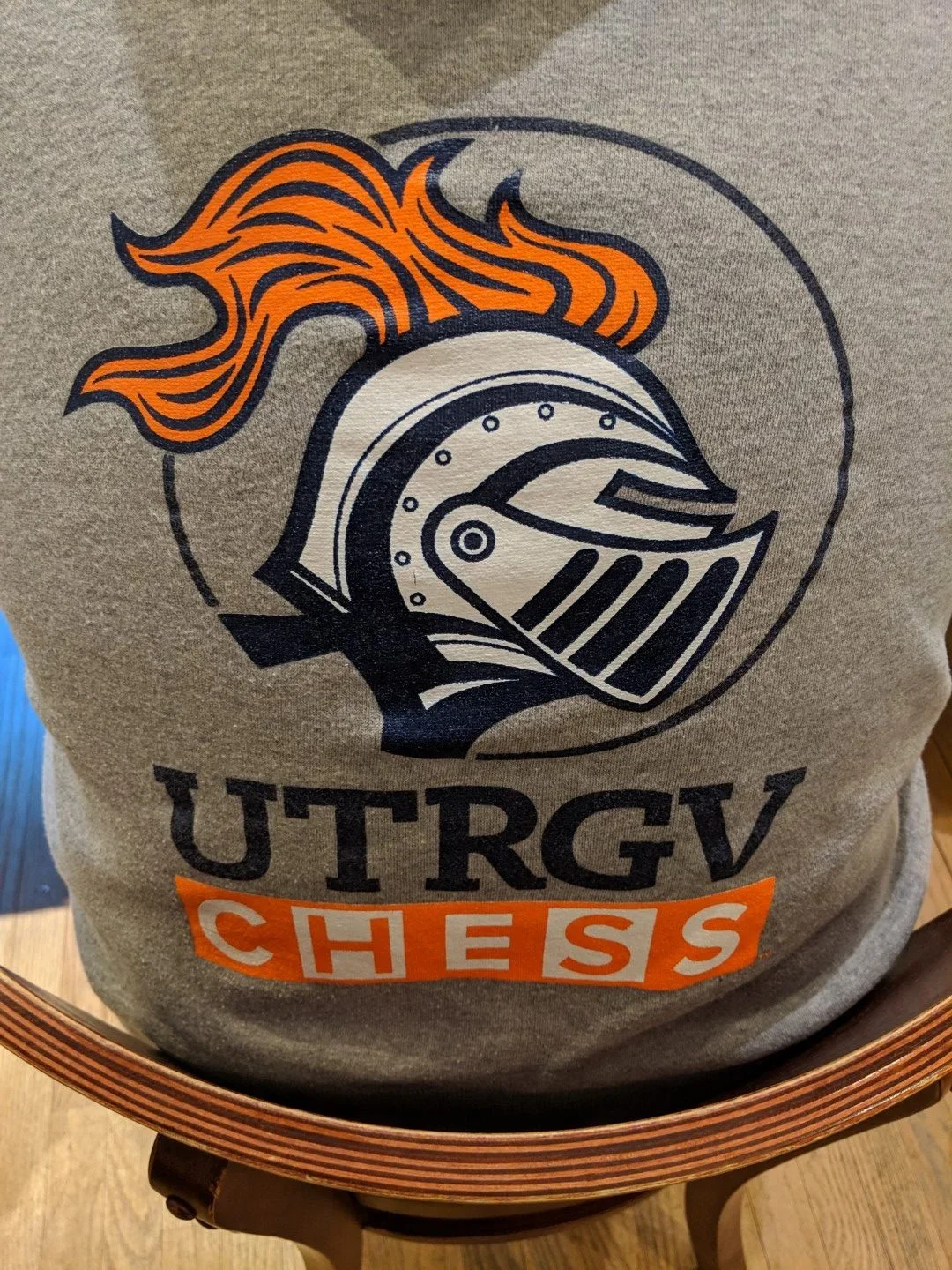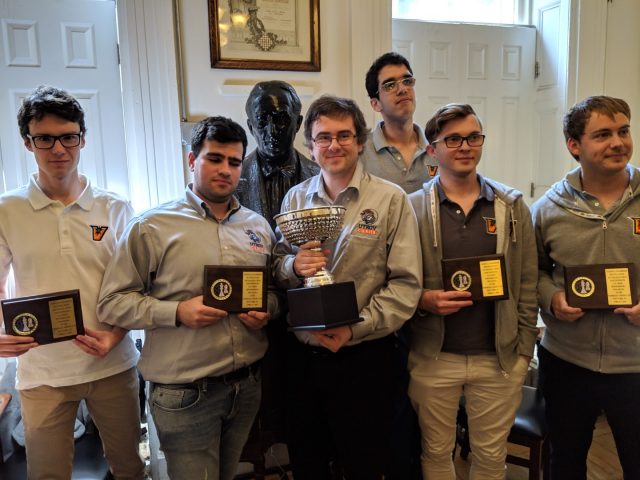
UTRGV, 2019 Final Four Champs
While New Yorkers packed the streets and parks to enjoy the beautiful spring weekend of April 6th and 7th, four of the nation’s best college teams were hunkered down over their boards inside of the historic Marshall Chess Club looking to bring home the 2019 President’s Cup. The Final Four of College Chess (as the event has come to be known) saw last year’s champions, the University of Texas Rio Grande Valley, mount a successful title defense.
This two-year mini-streak comes at the expense primarily of Webster University, which had been on a record five-year run from 2013-2017 and was the top-seeded team at both the 2018 and 2019 events.
The Teams
University of Texas Rio Grande Valley (RGV)
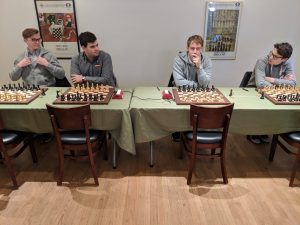
UTRGV, Round 1

GM Hovhannes Gabuzyan (2708)
GM Kamil Dragun (2668)
GM Andrey Stukopin (2673)
GM Vladimir Belous (2626)
IM Guillermo Vazquez (2556)
Coach: GM Bartek Macieja
Webster University
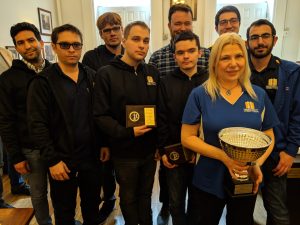
Webster, 2nd Place, 2019 Final Four

GM Lazaro Bruzon Batista (2752)
GM Illia Nyzhnyk (2746)
GM Yuniesky Quesada-Perez (2704)
GM Yasif Durarbayli (2697)
GM Alexandr Shimanov (2692)
GM Emilio Cordova (2646)
Coaches: GM Susan Polgar and FM Paul Truong
University of Texas at Dallas (UTD)
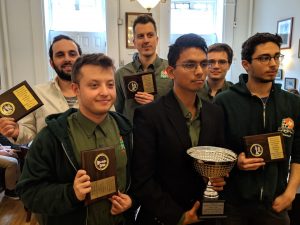
UTD, 3rd Place, 2019 Final Four

GM Anton Kovalyov (2664)
GM Gil Popilski (2598)
GM Razvan Preotu (2590)
IM Omer Reshef (2566)
IM Kacper Drozdowski (2562)
GM David Bereczes (2548)
Coach: GM Julio Sadorra
Harvard University
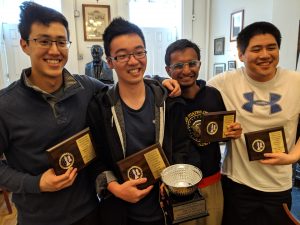
Harvard, 4th Place, 2019 Final Four
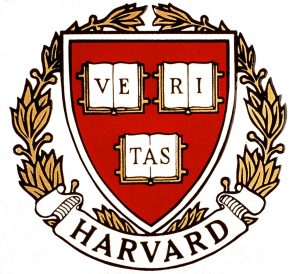
GM Darwin Yang (2564)
IM Richard Wang (2429)
FM Varun Krishnan (2369)
NM Bryan Hu (2337)
NM Andrew H. Lu (2199)
Coach: None
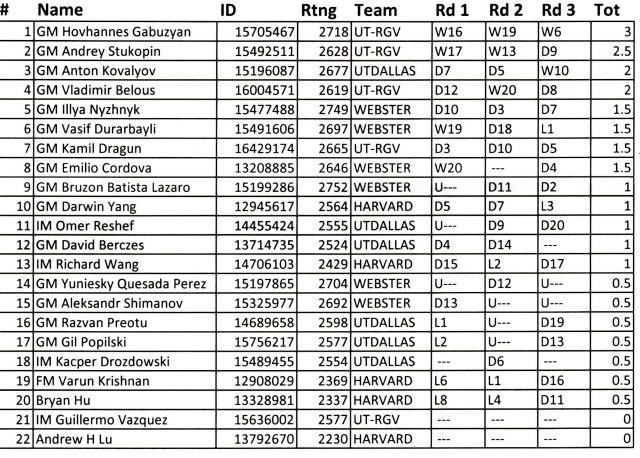
Wall Chart, 2019 Final Four
While RGV were the defending champions, they still came to the Marshall as “only” second seeds behind powerhouse Webster University. Webster was hungry to reclaim their place at the top of college chess, but by the end of day one, RGV enjoyed a 6.5-5.0 lead, with UTD (3.0) and Harvard (1.5) having no chance at the top spot.
Even though this meant that for Webster to overtake RGV they would need to score at least three victories on four boards in their final-round, head-to-head match, RGV was not taking anything for granted. In fact, they showed up at the Marshall a full hour before the 9:00 a.m. round start. (I remind you that these are college students. And chess players. This was a hardship!)
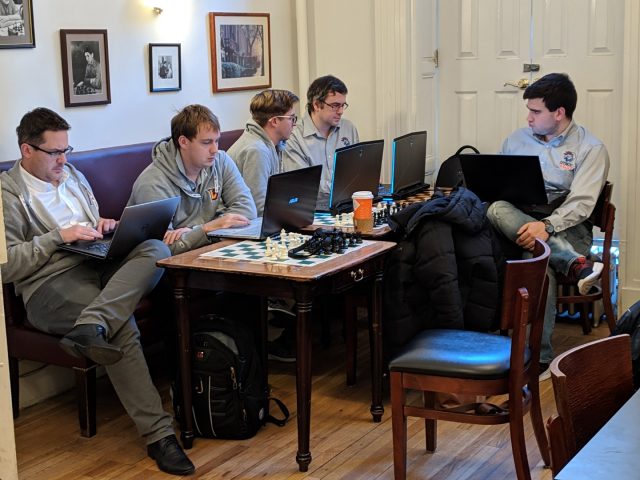
RGV, preparing for the critical 3rd round.
Webster arrived full of energy and enthusiasm on the morning of the final round:
https://youtu.be/pbcNxWV3eck
CLO interviewed Coach Macieja just after the final round started to get a sense of how his team approached this key round:
https://youtu.be/0wa9ss7H_bg
Webster coach Polgar was keeping any specific plans her team had close to her vest. GM Maxim Dlugy helped set the stage for the final-day events;
CLO also asked him about his days as President of US Chess as we reminisce in this 80th anniversary year for our organization:
https://youtu.be/VVJlyhS188Q
This was a new experience for the Webster squad: Never before had they been trailing going into the final round. Ultimately, they endured another first: their first-ever match loss in the Final Four as RGV managed to defeat them 2.5-1.5 in the last round, with three draws and a victory on board three by GM Hovhannes Gabuzyan over GM Vasif Durarbayli. To be fair, this was not a “normal” situation for Webster as they had to go all out with risky play to have any chance of overcoming the deficit.
The final team scores were: RGV 9.0, Webster 6.5, UTD 5.5, Harvard 3.0. GM Susan Polgar, head coach for Webster, immediately offered her congratulations to RGV, with FM Paul Truong, coach and chief strategist for Webster, offering to RGV, “You guys are tough!”
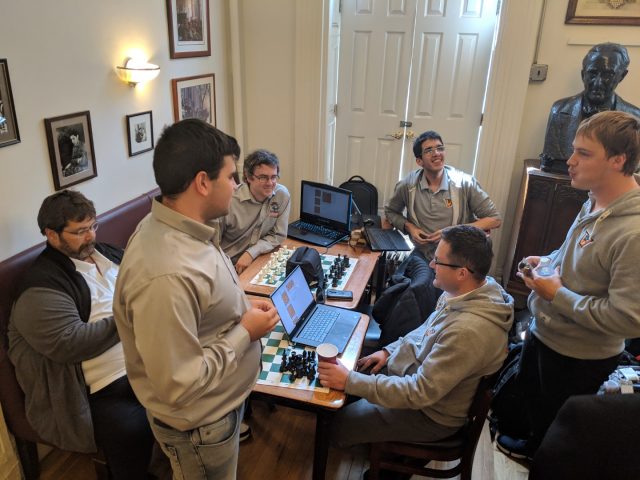
RGV, enjoying their victory!
GM Gabuzyan, playing board three in all three rounds, was the only player to win all three of his games. He was the Armenian national champion in 2017 and is currently a sophomore in the Management program.
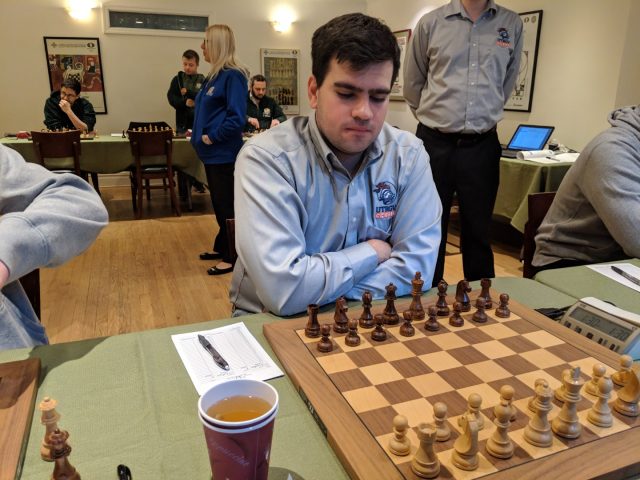
Hovhannes Gabuzyan
Hovhannes selected his round one win against GM Razvan Preoutu of UTD as his most interesting game, which he has annotated for
CLO:
[pgn]
[Event "The President's Cup"]
[Site "?"]
[Date "2019.04.06"]
[Round "1.3"]
[White "Gabuzyan, Hovhannes"]
[Black "Razvan, Preotu"]
[Result "1-0"]
[ECO "B23"]
[WhiteElo "2718"]
[BlackElo "2598"]
[Annotator "Hovhannes Gabuzyan"]
[PlyCount "69"]
[EventDate "2019.??.??"]
[SourceVersionDate "2019.04.07"]
[WhiteTeam "UTRGV"]
[BlackTeam "UTD"]
1. e4 c5 2. Nc3 d6 3. f4 {The so-called closed Sicilian variation. The spirit
of this position is that White will lock the center with Nc3 and e4 and then
will try to get a space advantage followed by an attack on the kingside. As
Black has a pawn on c5, his counterplay will be on the queenside.} g6 4. Nf3
Bg7 5. Bc4 Nc6 (5... e6 $2 $14 6. d4 cxd4 7. Nxd4) 6. O-O e6 7. d4 $5 {This
only looks like a sacrifice; White is winning the pawn back later with the
idea is that the d6 pawn will be weak.} (7. Qe1 Nge7 8. d3 O-O 9. f5 {These
are the main lines with complicated, sharp positions.}) 7... cxd4 8. Nb5 a6 (
8... d5 $14 9. exd5 exd5 10. Bxd5 $14) 9. Nbxd4 d5 10. Nxc6 {I decided to
leave my opponent with not-very-strong pawns in the center, as well as many
weak squares and potential outposts for me.} (10. exd5 exd5 11. Bb3 Bg4 $13 {
This position is slighly better for White, but it is complicated as the f4
pawn makes White's king slightly weak and Black will have good counterplay.})
10... bxc6 (10... Qb6+ $2 $14 11. Ncd4 dxc4 12. c3 {White has very good
squares in the center and the pawn on c4 can be attacked. There are also weak
dark squares in Black's position.}) 11. Bd3 Ne7 12. Qe2 (12. Be3 $1 $14 Bxb2
13. Rb1 Bg7 14. e5 {This is an interesting pawn sacrifice for initative and
the c5 square, but I wanted to play safely and chose the other continuation.})
12... O-O 13. c4 Bb7 14. Be3 $1 {Forcing my opponent to close the center,
otherwise a very unpleasant Bc5 is coming. After ... d4 I was planning to
start a kingside attack.} d4 15. Bd2 c5 16. h4 $1 {A simple but strong idea. I
am planning to play h5 and take on g6 which will terribly weaken the g5 square,
creating a fantastic outpost for my knight.} Qd7 17. h5 f5 $2 {A bad move, but
it is hard to blame Black for it as waiting until White mates on the kingside
is not a pleasant option. However, ... Rae8 first was a little better.} (17...
Rae8 $14) 18. hxg6 Nxg6 (18... hxg6 19. Rae1 $14) 19. Ng5 Rfe8 (19... h6 $16
20. exf5 exf5 21. Qe6+ Qxe6 22. Nxe6 Rfc8 (22... Be4 23. Nxc5 $1 $18 (23. Nxf8
$4 Rxf8 $13)) 23. Bxf5) 20. Qh5 Nf8 21. Rae1 {There is no reason to hurry. It
is important to bring my last passive piece into the game.} h6 22. Nf3 fxe4 23.
Bxe4 Bxe4 24. Rxe4 {Almost all of Black's pawns are weak and his king is under
attack. Black is lost.} Rac8 25. Ne5 Qb7 (25... Bxe5 $2 $18 26. fxe5) 26. Re2
Re7 (26... Qxb2 $2 27. Qf7+ Kh8 28. f5 $18) 27. Nd3 $1 {Instead of going for
an immediate mating attack, I first wanted to consolidate my position. This
d3-knight is a monster that defends all and attacks c5.} Rf7 28. b3 Rf5 29. Qh3
Rf7 (29... h5 30. Rxe6 Nxe6 31. Qxf5) 30. Rf3 $1 {Rg3 will destroy Black's
king's defences.} Qc7 31. Rg3 Qd8 32. Qxh6 Qf6 33. Qh5 Qf5 34. Qf3 Ng6 (34...
Nh7 35. Re5) 35. Rh3 {A satisfying victory to put me in the right frame of
mind for the rest of the event. I defeated Harvard's FM Varun Krishnan in
round two and Webster's GM Vasif Durarbayli in the final round.} 1-0
[/pgn]
All games can be downloaded from
uschessfinalfour.org. More annotated games will appear in our
Chess Life report in the July issue, but to whet your appetite, here are some tactical gems from the weekend provided to us by IM Vignesh Panchanatham, who is currently studying at Princeton University where he is a freelance reporter with Princeton's University Press Club. He tied for first in the top section with five others at SuperNationals VI in 2017, which he wrote about in the August 2017
Chess Life.
[pgn]
[Event "US Chess Final Four 2019"]
[Site "Marshall Chess Club"]
[Date "2019.04.08"]
[White "Hu, Bryan"]
[Black "Cordova, Emilo"]
[Result "0-1"]
[ECO "A77"]
[WhiteElo "2337"]
[BlackElo "2646"]
[Annotator "Panchanatham"]
[SetUp "1"]
[FEN "r1bqr1k1/pp3pbp/3p1np1/2pP4/2N1PPn1/2N5/PP2B1PP/R1BQ1RK1 b - - 0 13"]
[PlyCount "37"]
{How does Black win a pawn?} 13... Nxe4 14. Bxg4 Bd4+ 15. Be3 (15. Kh1
Bxg4 16. Qxg4 Nf2+ 17. Rxf2 Re1+ 18. Rf1 Rxf1#) 15... Bxe3+ 16. Nxe3 Nxc3 17.
bxc3 Rxe3 18. f5 Qh4 19. Qd2 Re5 20. Rf4 g5 21. g3 Qh6 22. Rff1 Qf6 23. Rae1
Rxe1 24. Rxe1 Bd7 25. Bh3 h6 26. Re3 Re8 27. Rxe8+ Bxe8 28. Qe3 Bb5 29. g4 Bc4
30. Bg2 Kf8 31. Qe4 Qxc3 0-1
[/pgn]
[pgn]
[Event "US Chess Final Four 2019"]
[Site "Marshall Chess Club"]
[Date "2019.04.07"]
[White "Durarbayli, Yasif"]
[Black "Gabuzyan, Hovhannes"]
[Result "0-1"]
[ECO "B96"]
[WhiteElo "2697"]
[BlackElo "2708"]
[Annotator "Panchanatham"]
[SetUp "1"]
[FEN "8/5r2/4k3/4p3/Pp1pK1P1/6Rp/1P5P/8 w - - 0 46"]
[PlyCount "28"]
{[#]} {In this drawish position, Durarbayli pushed for a win for team purposes,
even though repetition would have secured the draw. His next move allowed
Gabuzyan to penetrate and eventually push his pawns through. This was the
decisive game in the final round that helped UTRGV defeat Webster.} 46. a5 $2
Rf4+ 47. Kd3 Rf2 48. Kc4 Rxh2 {Now the rook gets to the second rank and white
is revealed to be overextended.} 49. a6 Rc2+ 50. Kb5 h2 51. Rh3 d3 52. a7 Rc8
53. Rxh2 e4 54. Rh6+ Ke5 55. Rb6 Ra8 56. Kxb4 Rxa7 57. Kc3 Rc7+ 58. Kd2 Rc2+
59. Kd1 e3 0-1
[/pgn]
[pgn]
[Event "US Chess Final Four 2019"]
[Site "Marshall Chess Club"]
[Date "2019.04.07"]
[White "Belous, Vladimir"]
[Black "Cordova, Emilo"]
[Result "1/2-1/2"]
[ECO "A30"]
[WhiteElo "2626"]
[BlackElo "2646"]
[Annotator "Panchanatham"]
[SetUp "1"]
[FEN "r2qk2r/pbn2pbp/1pn3p1/2p5/3p4/1PN2NP1/PB2PPBP/R1QR2K1 w kq - 0 13"]
[PlyCount "38"]
{Belous pulls a long variation out of his hat in order to equalize,
helping his team secure victory. He sacs a piece and then doesn't get it back
for 12 moves, relying on pressure on the black king and open files to ensure
that the material count will become equal eventually.} 13. Nxd4 $1 {This move
allows white to equalize. Despite being down a piece, the following
combination allows white to win it back.} cxd4 (13... Nxd4 14. Bxb7) (13...
Bxd4 14. e3) 14. Nb5 {The rays of the queen and the bishop crisscross to
pinpoint the c6 knight. Black's exposed king makes it hard for him to
consolidate.} Qd7 15. Bxc6 Bxc6 16. Bxd4 Bxd4 17. Rxd4 Nd5 18. Qd2 O-O-O {
White calmly lets black castle with the knowledge that the pins ensure that he
will get his piece back} 19. Rc1 {threatening Rxc6+ and Nxa7} Kb7 20. Nc3 Qe6
21. Nxd5 Rxd5 (21... Bxd5 22. e4) 22. Rxc6 $1 Kxc6 (22... Rxd4 23. Qxd4 Kxc6
24. Qxh8) 23. Rxd5 Qxd5 24. Qc3+ Kd7 25. Qxh8 {After 12 moves, white finally
gets back to even material!} Qd1+ 26. Kg2 Qxe2 27. Qxh7 Qe4+ 28. Kg1 Qb1+ 29.
Kg2 Qe4+ 30. Kg1 Qe1+ 31. Kg2 Qe4+ 1/2-1/2
[/pgn]
[pgn]
[Event "US Chess Final Four 2019"]
[Site "Marshall Chess Club"]
[Date "2019.04.08"]
[White "Krishnan, Varun"]
[Black "Gabuzyan, Hovhannes"]
[Result "0-1"]
[ECO "B90"]
[WhiteElo "2369"]
[BlackElo "2708"]
[Annotator "Panchanatham"]
[SetUp "1"]
[FEN "8/Q2nkp2/3p1q2/7p/1r2Pp1P/5P2/7R/R2B1n1K w - - 0 39"]
{In this extremely double-edged position, White is only slight worse
according to the computer if he finds the right move!} 39. Ba4 $2 ({The
computer shows the way:} 39. e5 Qxe5 40. Rha2 Ng3+ 41. Kg2 {and White is
surviving}) 39... Ng3+ 40. Kg2 Rb2+ 41. Kg1 Rb7 $1 {Now Black can take the
rook on a1 with check and does not need to worry about White taking on d7} 42.
e5 Qxe5 43. Qa6 Qxa1+ 0-1
[/pgn]
THE SKITTLES ROOM
Sights and sounds from the Final Four to give you the full flavor of the event.
GMs Vladimir Belous (RGV) and Emilio Cordova (Webster) discussing their last-round draw:
https://youtu.be/uysdq1GAzdI
Grandmaster Vasif Durarbayli of Webster on the Marshall’s back terrace alone with his thoughts during his round-one game against Harvard’s FM Varun Krishnan:
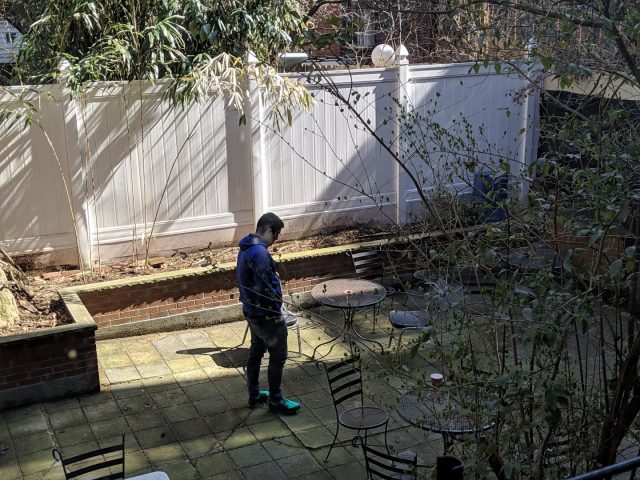
GM Durarbayli alone with thoughts
The snack of choice for the players was New York’s iconic black and white cookie, provided by organizer Mark Herman. Does anyone doubt that this is the best choice for chess players (symbolically at least, if not nutritionally)? In a famous episode of the TV show “Seinfeld,” Jerry says, “… the black and white cookie. I love the black and white. Two races of flavor living side by side. It's a wonderful thing isn't it?” Perhaps this speaks to the collegial nature of the Final Four as well.
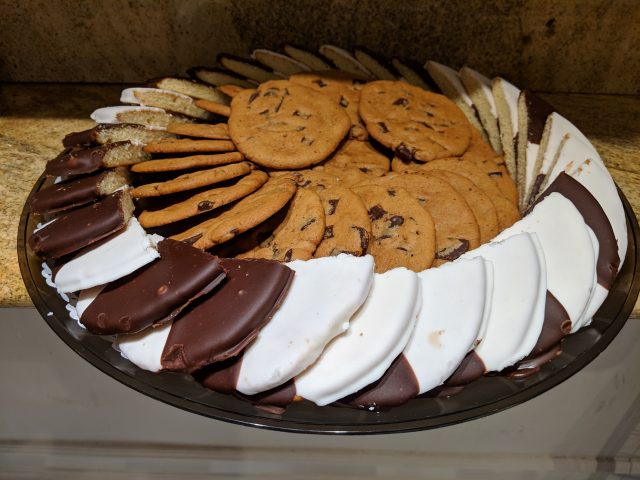
The iconic black and white cookie (with inferior cookies)
Board two was the “Magnus Carlsen” board, signed by the World Champion for Mark Herman. Certainly there is nothing intimidating for the players about this, right? Or maybe it is motivating?
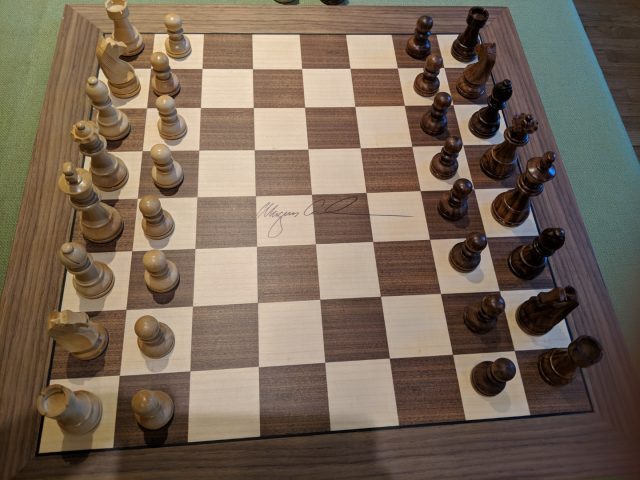
The Carlsen board
Team jackets help build camaraderie.
Before the “Drawing of Colors” ceremony on the evening of April 5, Webster players blew off some steam with Bughouse:
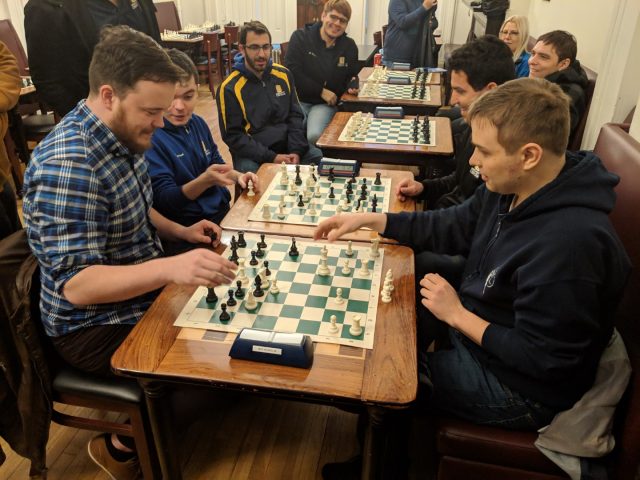
Webster plays bughouse!
Tonight (April 8), Texas Tech, which has made it to the Final Four eight of the last nine years but just missed out this year, plays in the finals of that “other” Final Four for the first time,
the NCAA’s basketball tournament. Apparently, the sporting gods will allow any one school only so much success at one time as Texas Tech was the victim of the tiebreak system at the Pan-Ams, preventing them from qualifying this year.
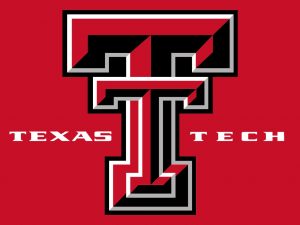
Texas Tech!
The Many vs. the Few: In the last round, UTD played Harvard. UTD is the granddaddy of this event, having won the first event in 2001 and then going on to compete in a total of 16 of the event's 19 years. Harvard’s only previous appearance was in 2002 when they also finished in fourth place. UTD is on the left in this photo:
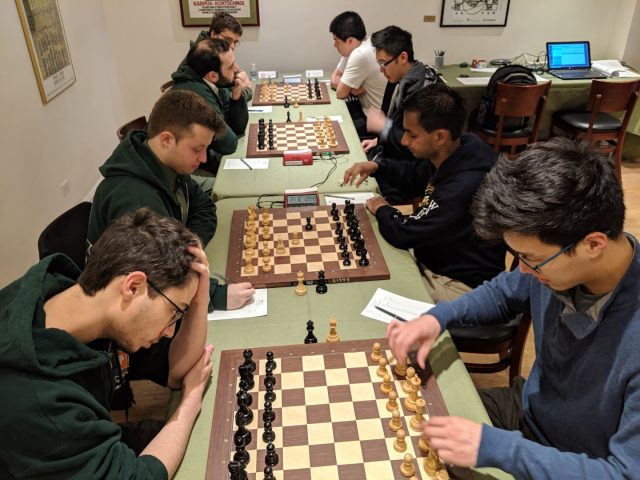
UTD (left) vs. Harvard
This is the ninth year that Mark Herman has organized the Final Four, and it is the sixth year that New York City played host (the first two NYC events were at the New York Athletic Club.)
CLO talked to Herman about his history with the event:
https://youtu.be/uzVLDucqaBE
International Arbiter Oscar Garcia (left, with Mark Herman) directed. Frank Marshall (in bust form) appears to approve:
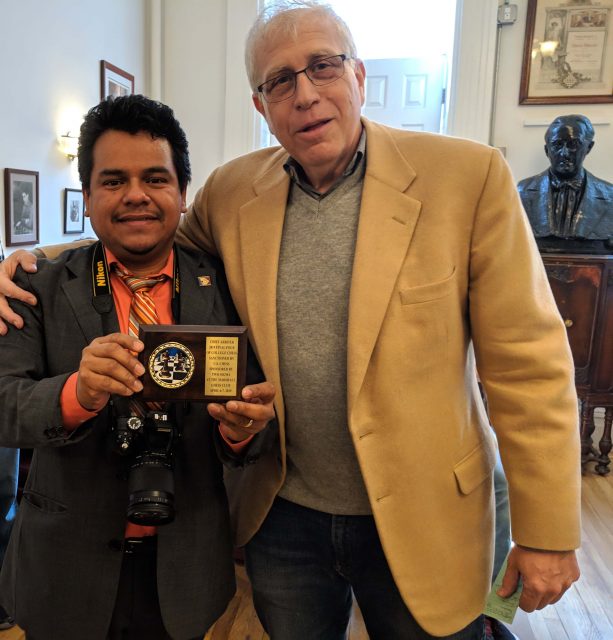
IA Oscar Garcia and Mark Herman
Two Sigma once again sponsored this event, with the funds passing through the U.S. Chess Trust.

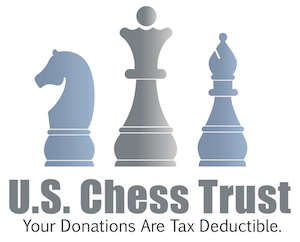
The live streaming commentary archive is expected to be uploaded to YouTube soon.
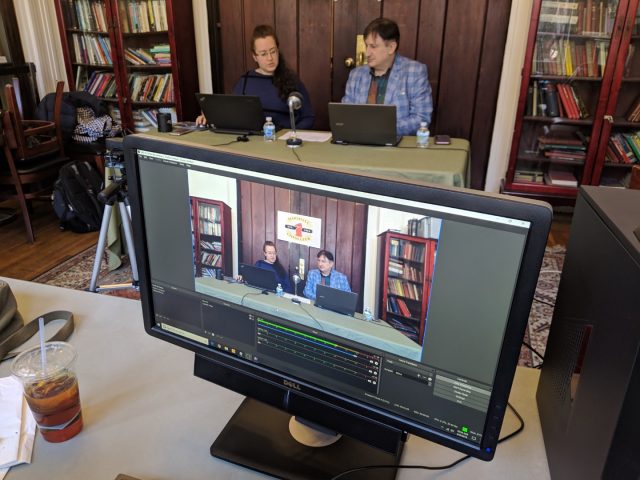
GMs Dlugy and Krush livestreaming
Thus closes another exciting year in the ever-growing, increasingly competitive college chess community. The next academic year brings yet another school adding a chess program as the
University of Missouri joins the fray. Given “Mizzou’s” partnership with the Saint Louis Chess Club, coach GM Cristian Chirila’s team can be expected to be an instant challenger for the top spot, as was Saint Louis University when its program began in 2015—they made the Final Four by 2017. We’ll get a hint of what to expect when the next college season starts with the 2019 Pan-American Intercollegiate Team Chess Championship (the “Pan-Ams”) at the end of December in Charlotte, North Carolina. With Webster, Saint Louis University, and now the University of Missouri, another key question for the college chess community is: Has the college chess strongpoint shifted from Texas to Missouri?
Author note: Dan Lucas is the US Chess Senior Director of Strategic Communication. Photos and videos may be reused with this attribution: Photo <or video> by Dan Lucas, courtesy of US Chess.
Look for Al Lawrence’s comprehensive Final Four report in the July issue of Chess Life.
 UTRGV, 2019 Final Four Champs
UTRGV, 2019 Final Four Champs UTRGV, Round 1
UTRGV, Round 1 GM Hovhannes Gabuzyan (2708)
GM Kamil Dragun (2668)
GM Andrey Stukopin (2673)
GM Vladimir Belous (2626)
IM Guillermo Vazquez (2556)
Coach: GM Bartek Macieja
GM Hovhannes Gabuzyan (2708)
GM Kamil Dragun (2668)
GM Andrey Stukopin (2673)
GM Vladimir Belous (2626)
IM Guillermo Vazquez (2556)
Coach: GM Bartek Macieja
 Webster, 2nd Place, 2019 Final Four
Webster, 2nd Place, 2019 Final Four GM Lazaro Bruzon Batista (2752)
GM Illia Nyzhnyk (2746)
GM Yuniesky Quesada-Perez (2704)
GM Yasif Durarbayli (2697)
GM Alexandr Shimanov (2692)
GM Emilio Cordova (2646)
Coaches: GM Susan Polgar and FM Paul Truong
GM Lazaro Bruzon Batista (2752)
GM Illia Nyzhnyk (2746)
GM Yuniesky Quesada-Perez (2704)
GM Yasif Durarbayli (2697)
GM Alexandr Shimanov (2692)
GM Emilio Cordova (2646)
Coaches: GM Susan Polgar and FM Paul Truong
 UTD, 3rd Place, 2019 Final Four
UTD, 3rd Place, 2019 Final Four GM Anton Kovalyov (2664)
GM Gil Popilski (2598)
GM Razvan Preotu (2590)
IM Omer Reshef (2566)
IM Kacper Drozdowski (2562)
GM David Bereczes (2548)
Coach: GM Julio Sadorra
GM Anton Kovalyov (2664)
GM Gil Popilski (2598)
GM Razvan Preotu (2590)
IM Omer Reshef (2566)
IM Kacper Drozdowski (2562)
GM David Bereczes (2548)
Coach: GM Julio Sadorra
 Harvard, 4th Place, 2019 Final Four
Harvard, 4th Place, 2019 Final Four GM Darwin Yang (2564)
IM Richard Wang (2429)
FM Varun Krishnan (2369)
NM Bryan Hu (2337)
NM Andrew H. Lu (2199)
Coach: None
GM Darwin Yang (2564)
IM Richard Wang (2429)
FM Varun Krishnan (2369)
NM Bryan Hu (2337)
NM Andrew H. Lu (2199)
Coach: None
 Wall Chart, 2019 Final Four
Wall Chart, 2019 Final Four RGV, preparing for the critical 3rd round.
RGV, preparing for the critical 3rd round. RGV, enjoying their victory!
RGV, enjoying their victory! Hovhannes Gabuzyan
Hovhannes Gabuzyan GM Durarbayli alone with thoughts
GM Durarbayli alone with thoughts The iconic black and white cookie (with inferior cookies)
The iconic black and white cookie (with inferior cookies) The Carlsen board
The Carlsen board Webster plays bughouse!
Webster plays bughouse! Texas Tech!
Texas Tech! UTD (left) vs. Harvard
UTD (left) vs. Harvard IA Oscar Garcia and Mark Herman
IA Oscar Garcia and Mark Herman
 The live streaming commentary archive is expected to be uploaded to YouTube soon.
The live streaming commentary archive is expected to be uploaded to YouTube soon.
 GMs Dlugy and Krush livestreaming
GMs Dlugy and Krush livestreaming

